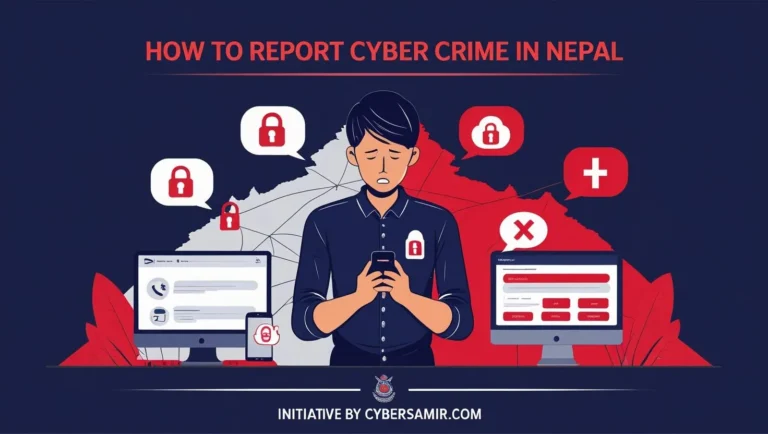
Cybersecurity Career Guide: How to Get Started in Nepal (2025)
Cybersecurity Career Guide: How to Get Started in Nepal
Building a Future in Nepal’s Growing Cybersecurity Industry
Introduction
With Nepal’s rapid digital transformation and increasing cyber threats, such as the $12.4 billion lost globally to AI-driven scams in 2024, the demand for cybersecurity professionals is soaring. Nepal’s IT sector is growing, with opportunities in banking, telecom, and e-commerce needing skilled experts to combat threats like phishing, ransomware, and sextortion. This guide outlines how to start a cybersecurity career in Nepal, covering education, skills, certifications, and job opportunities.
Why Choose a Cybersecurity Career in Nepal?
Nepal’s internet penetration exceeds 90% in urban areas, but cyber threats are rising, with a 137% increase in sextortion scams globally in 2025, per Avast. Cybersecurity professionals are critical to protecting businesses, government systems, and individuals. The field offers competitive salaries, with entry-level roles in Kathmandu earning NPR 30,000–50,000 monthly, and ample growth potential as Nepal’s digital economy expands.
Step 1: Build a Strong Educational Foundation
A solid educational background is key to entering cybersecurity. Consider the following options:
- Degree Programs: Pursue a Bachelor’s in Computer Science, Information Technology, or Cybersecurity from universities like Tribhuvan University or Kathmandu University. These programs cover networking, programming, and security fundamentals.
- Diploma Courses: Short-term diplomas in cybersecurity or ethical hacking are offered by institutes like NIIT or Aptech in Nepal.
- Self-Learning: Online platforms like Coursera, Udemy, and Cybrary offer affordable courses on cybersecurity basics, ethical hacking, and network security.
Step 2: Develop Essential Skills
Cybersecurity requires a mix of technical and soft skills. Focus on:
- Technical Skills: Learn networking (TCP/IP, firewalls), programming (Python, C), and operating systems (Linux, Windows). Understanding penetration testing and malware analysis is also crucial.
- Analytical Skills: Develop problem-solving and critical thinking to analyze threats and vulnerabilities.
- Communication Skills: Explain complex security issues to non-technical stakeholders, a key skill for roles like security analyst.
Step 3: Earn Industry-Recognized Certifications
Certifications validate your skills and boost employability. Recommended certifications for beginners include:
- CompTIA Security+: Covers foundational cybersecurity concepts, ideal for entry-level roles.
- Certified Ethical Hacker (CEH): Focuses on penetration testing and ethical hacking techniques.
- Cisco’s CCNA Security: Emphasizes network security, valuable for Nepal’s telecom sector.
These certifications are available through training centers in Kathmandu or online platforms like EC-Council.
Step 4: Gain Practical Experience
Hands-on experience is essential. Start with:
- Internships: Join internships at IT firms, banks, or telecom companies like Ncell or Nepal Telecom.
- Capture the Flag (CTF): Participate in CTF competitions on platforms like Hack The Box to practice hacking skills.
- Open-Source Projects: Contribute to cybersecurity projects on GitHub to build a portfolio.
Step 5: Explore Job Opportunities in Nepal
Nepal’s cybersecurity job market is growing, with roles like:
- Security Analyst: Monitors and responds to security incidents.
- Penetration Tester: Tests systems for vulnerabilities.
- Security Consultant: Advises organizations on security strategies.
Job portals like MeroJob and KumariJob list cybersecurity roles, particularly in Kathmandu and Pokhara. Networking at tech events like CAN InfoTech can also open doors.
Challenges in Nepal’s Cybersecurity Industry
Aspiring professionals face challenges like limited training centers, high certification costs, and a lack of awareness about cybersecurity careers. Solutions include leveraging online resources, seeking scholarships for certifications, and advocating for more government support in cybersecurity education.
Conclusion
With cyber threats like AI-driven scams costing $12.4 billion globally in 2024, cybersecurity is a critical and rewarding career path in Nepal. By building a strong educational foundation, acquiring skills, earning certifications, gaining experience, and exploring local opportunities, aspiring professionals can thrive in this field. Start your journey today with resources from FBI or Avast to stay informed about cyber threats.

🔔 Subscribe to Tech Alerts & Updates
Never miss an important cybersecurity update in Nepal.


